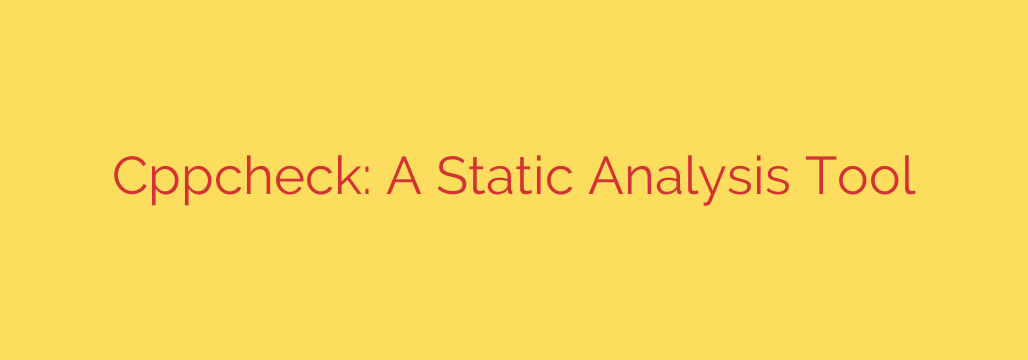
Boost Your C++ Code Quality with Cppcheck: A Deep Dive into Static Analysis
In the complex world of C and C++ development, even the most disciplined programmer can introduce subtle bugs that slip past traditional testing. Memory leaks, buffer overruns, and undefined behavior can hide deep within a codebase, only to emerge at the worst possible moment. This is where static analysis tools become an indispensable part of a developer’s toolkit.
Cppcheck is a powerful, open-source static analysis tool designed specifically for C and C++ code. It acts as an automated code reviewer, meticulously scanning your source files to identify potential bugs, security vulnerabilities, and stylistic issues before the code is even compiled or run. By integrating this tool into your development process, you can catch critical errors early, improve code maintainability, and ship more reliable software.
What is Static Analysis, and Why Does It Matter?
Static program analysis is a method of debugging that is performed by examining the code without executing it. This is in direct contrast to dynamic analysis, which requires the program to be running.
The key advantage of the static approach is its ability to cover all possible execution paths, not just the ones triggered during a specific test run. Unlike dynamic analysis, which can only find bugs in the code that is actually executed, static analysis examines every line. This comprehensive coverage allows it to uncover hidden, edge-case bugs that might be missed by even the most thorough quality assurance testing.
The Power of Cppcheck: A Bug Hunter on Your Team
While many static analysis tools exist, Cppcheck has carved out a unique niche for several reasons. Its primary goal is to find genuine bugs and reduce the number of false positives. Many linters and analysis tools can overwhelm developers with warnings about coding style or minor issues, but Cppcheck focuses on identifying definite errors that could lead to crashes or unpredictable behavior.
Key features that make Cppcheck a go-to choice for C++ developers include:
- Cross-Platform Compatibility: It runs seamlessly on Windows, Linux, and macOS.
- No Compilation Needed: It directly parses your source files, making it fast and easy to integrate.
- Highly Configurable: You can enable or disable specific checks to tailor the analysis to your project’s needs.
- Strong Community and Open-Source: It is actively maintained and improved by a global community of developers.
Common Bugs and Vulnerabilities Cppcheck Can Uncover
Integrating Cppcheck into your workflow can help you automatically detect a wide range of critical programming errors. Here are some of the most important categories of bugs it excels at finding:
- Memory-Related Issues: These are among the most dangerous bugs in C++. Cppcheck identifies memory leaks, buffer overruns, and the use of memory after it has been freed.
- Security Vulnerabilities: It can flag potential security risks like using unsafe functions (e.g.,
strcpy), uninitialized variables that could hold sensitive data, and integer overflows. - Null Pointer Dereferences: A common cause of application crashes, Cppcheck can trace variable states to warn you when a pointer might be null before it is used.
- Undefined Behavior: The C++ standard leaves certain operations as “undefined,” meaning they can behave differently across compilers or platforms. Cppcheck flags many of these, such as division by zero or bit-shifting by a negative amount.
- Resource Leaks: Beyond memory, it can detect unclosed file handles or other system resources that are not properly released.
- API Usage Errors: It can identify incorrect usage of standard library functions, such as passing invalid arguments to functions like
printf.
Actionable Tips: Integrating Cppcheck into Your Workflow
Getting started with Cppcheck is remarkably straightforward. At its simplest, you can run it from the command line against your source files.
A typical command might look like this:
cppcheck --enable=all --inconclusive --std=c++11 your_project_directory/
Here’s a breakdown of that command:
--enable=all: Activates all available checks, including style and performance warnings. For a stricter focus on bugs, you might use--enable=warning,performance,portability.--inconclusive: Tells Cppcheck to report on issues it is not 100% certain about, which can help find more complex bugs.--std=c++11: Specifies the C++ standard your project uses.
For maximum effectiveness, integrate Cppcheck directly into your Continuous Integration/Continuous Deployment (CI/CD) pipeline. By running it automatically with every commit or pull request, you create a safety net that prevents new bugs from being introduced into the main branch. Most modern CI tools like Jenkins, GitLab CI, and GitHub Actions have plugins or simple script integrations for Cppcheck.
Cppcheck vs. Compiler Warnings
Modern compilers like GCC and Clang provide excellent warning flags (-Wall, -Wextra) that catch many common errors. So, why use Cppcheck?
The answer is depth and scope. Compiler warnings are primarily focused on issues related to syntax and generating valid machine code. Cppcheck, on the other hand, performs a deeper, flow-sensitive analysis across multiple files. It can trace the potential values of a variable from initialization to its use in a distant function, allowing it to detect logical errors that compilers often miss. Think of your compiler as a proofreader for grammar, while Cppcheck is an editor looking for plot holes in the story.
By combining stringent compiler warnings with a dedicated static analysis tool like Cppcheck, you create a robust, multi-layered defense against bugs, leading to safer, more stable, and more secure C++ applications.
Source: https://www.linuxlinks.com/cppcheck-static-analysis-tool/








